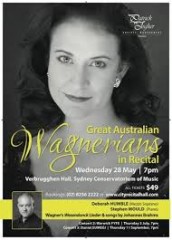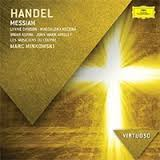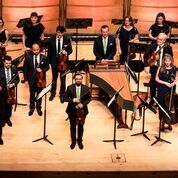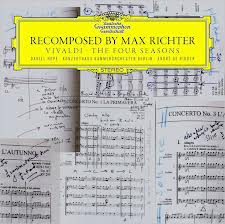Concert Review: Deborah Humble ‘Great Australian Wagnerians In Recital’

Great Australian Wagnerians in Recital
Deborah Humble
Verbrugghen Hall, Sydney Conservatorium
28 May 2014
Last year’s performances of Wagner’s Ring der Nibelungen in Melbourne reignited interest in Wagner’s music and the singers who perform it. One of the outcomes of this revived attention is a new series of concerts entitled Great Australian Wagnerians in Recital. In the first of this series, mezzo-soprano Deborah Humble and pianist Stephen Mould presented an all-German programme.
For nearly ten years Humble has been based in Hamburg where she has a well-established reputation in Wagnerian roles. Her initial training and experience, however, largely featured early music and this is a pointer to Humble’s desire to maintain a wide concert repertoire in addition to her operatic roles. This has been particularly evident since she became freelance singer in 2011. A fortnight ago she sang in acclaimed performances of Mendelssohn’s Elijah with the Sydney Symphony Orchestra under Paul McCreesh and in this recital she presented songs by Brahms and Wagner.
This was an interesting juxtaposition given that Brahms and Wagner were the two focal points of the great debate about the future direction of music during the second half of the nineteenth century. The recital was a reminder that both composers wrote enormously expressive and deeply moving music. It also emphasised that although Wagner was harmonically more adventurous, he never wrote tunes such as Brahms produced when in a lyrical vein.
From the opening of the recital Humble immediately established herself as a most accomplished exponent of lieder. Her rich, full tone is evenly produced throughout the range and her warm vocal production is achieved without intrusive vibrato. At the height of emotionally charged phrases her voice filled the hall effortlessly. She quickly established a close rapport with her audience and seemed to draw her listeners into the emotional world of whatever song she was currently singing. Like all accomplished lieder singers Humble pays close attention to the text and clearly communicates its changing moods to the audience.
The recital opened with eight of Brahms’s Zigeunerlieder. Humble displayed an instinctive feel for these gypsy songs with their sudden shifts of tempo and their passionate outbursts. This was matched by pianist Stephen Mould in lightning changes of mood from the tender to the dramatic, while never overpowering Humble.
The remainder of the first half consisted of a further six songs by Brahms. These covered a wide range of moods from yearning to playfulness and gave Humble an opportunity to project a wide range of feeling and characterisation. Several of the slower songs displayed her fine lyrical singing, excellent breath control and her ability to sustain long legato phrases. The final two songs in the bracket (Op. 91) each include a solo viola. These songs were written privately for the violinist Joseph Joachim and his wife, mezzo-soprano Amalie Schneeweiss, who were close friends of Brahms at the time; hence the unusual combination. The viola part was well played by Luke Spicer with an attractive tone, though he could have been a little more assertive so as to match the volume and presence of Humble in what are ideally duets for two equal parts.
The second half of the recital featured Wagner’s Wesendonck Lieder. Again, Humble excelled with her effortlessly full tone and her long, soaring sostenuto phrases. Her close communication with her audience created an intensely poignant atmosphere, particularly in the last song, Träume. Stephen Mould matched her in this. His playing was especially effective in his dramatic timing and his ability to suggest the orchestral colouring in the two songs closely based on the music Wagner was writing at the same time for Tristan und Isolde.
As an interesting postlude Humble and Mould performed a newly discovered song by Mendelssohn, Des Menschen Herz ist ein Schacht. This was written in 1842 and, like the Brahms viola songs in the first half of the recital, given privately to an associate. The song was never published and the original manuscript recently appeared for auction by Christie’s in London. Their sale catalogue reproduces the manuscript and by the magic of the internet Stephen Mould was able to transcribe it for what they believe was the world’s first live concert performance. This claim was carefully worded since the song was actually broadcast by BBC radio three weeks ago. This short work is a welcome addition to the repertoire of Mendelssohn’s songs, but it cannot be acclaimed as one of his finest.
As an encore Humble and Mould moved to Vienna for Meine Lippen sie küssen so heiß from Lehar’s Giudetta. Humble’s infectious personality completely won over the audience with her engagingly seductive performance.
It is unfortunate that the hall was less than half full and so many people missed hearing this superb recital given by such consummate artists. The next performance in this series of recitals will be given on 3 July by the extremely versatile baritone Warwick Fyfe whose unforgettable portrayal of Alberich was a highlight of the Melbourne Ring last year.
Larry Turner for SoundsLikeSydney©
Larry Turner has been singing in choirs for many years – both in Sydney and London. He is an avid attender of operas and concerts, with an emphasis on vocal music. He particularly enjoys music from both the great a capella period and the baroque – especially the lesser-known works of Bach and Handel. He has written programme notes for Sydney Philharmonia, the Intervarsity Choral Festival and the Sydneian Bach Choir and is currently part of a team researching the history of Sydney Philharmonia for its forthcoming centenary.
SoundsLikeSydney accepts no fee for reviews.







